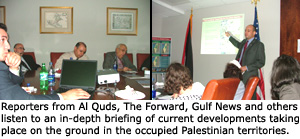FOR IMMEDIATE RELEASE
Contact Information: Hussein Ibish
September 27, 2004 - 12:00am
Washington DC, Sep. 27 -- The American Task Force on Palestine (ATFP) hosted a briefing by members of the PLO Negotiations Support Unit (NSU), who are making a week-long tour of congressional offices and non-profit groups. NSU Director Maen Areikat, policy adviser Khaled El Gindy, and legal advisers Diana Butto, Anwar Al Darkazally, and Leila Hilal highlighted three major issues endangering prospects of a two-state solution: the separation wall in the West Bank, the expansion of settlements in the West Bank and Jerusalem, and the Gaza disengagement plan.
 El Gindy cited the construction of the separation wall on Palestinian land and the settlements in East Jerusalem and in other Palestinian areas as the greatest obstacles to a viable Palestinian state, the establishment of which is crucial to peace in the region. Much of this wall has already been constructed. In many places, the wall severs Palestinian populations from their water sources, their agricultural resources, and their livelihoods. The International Court of Justice issued an advisory opinion in July 2004, declaring the current route of the wall illegal and calling on Israel to dismantle the parts of the wall that have been constructed within Palestinian Territory in the West Bank.
El Gindy cited the construction of the separation wall on Palestinian land and the settlements in East Jerusalem and in other Palestinian areas as the greatest obstacles to a viable Palestinian state, the establishment of which is crucial to peace in the region. Much of this wall has already been constructed. In many places, the wall severs Palestinian populations from their water sources, their agricultural resources, and their livelihoods. The International Court of Justice issued an advisory opinion in July 2004, declaring the current route of the wall illegal and calling on Israel to dismantle the parts of the wall that have been constructed within Palestinian Territory in the West Bank.
The final status of Jerusalem is being severely prejudiced, as the route of the wall attempts to change the municipal boundaries, restricting Palestinian access to its future capital, said Darkazally. In the West Bank as well as in East Jerusalem, the settlements pose a physical boundary to a contiguous Palestinian state. Since last year, two wholly new settlements have been built in East Jerusalem, further fragmenting Palestinian territory; and plans for settlement expansion in the West Bank were approved by the Israeli government in August 2004.
Following the Israeli disengagement from Gaza, Hilal stressed the importance of a “Day After Scenario” to ensure progress in the creation of a Palestinian state. The Quartet involved in the Road Map must develop this scenario, which ultimately leads to the commencement of permanent status negotiations based on the Road Map.
* * * * *
The Negotiations Support Unit will hold another briefing on Friday, October 1st at the Carnegie Endowment for International Peace at 12:00pm-2:00pm. The briefing, titled “Is a Two-State Solution still Possible?” is sponsored by the Foundation for Middle East Peace. All are welcome, RSVP to 202-835-3650 is required.
TAGS:
















